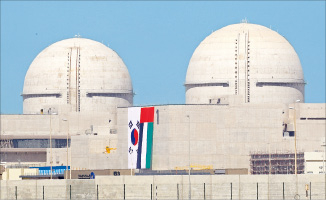
The Barakah nuclear power plant in the United Arab Emirates Saudi Arabia invited South Korea last week to join the bid for the construction of its first-ever nuclear power plants, worth over $10 billion, sources with knowledge of the matter said on Tuesday.South Korea is among the four countries, including France, China and Russia, which received the invitation letter for the tender of two nuclear reactors with an electricity generation capacity of 1.4 gigawatts each. The US, one of the preliminary bidders chosen by Saudi Arabia in 2018, was left off the list of candidates, the sources told The Korea Economic Daily.South Korea’s experience of building the United Arab Emirates’ first nuclear power plants and its price competitiveness are highly valued by the world's largest oil producer that is seeking to diversify its energy sources to reduce carbon emissions.The South Korean government is expected to make all-out efforts to win the nuclear reactor order, which would be its first nuclear plant deal in over a decade, spearheaded by President Yoon Suk-yeol who pledged pro-nuclear policy during his election campaign.South Korea’s Yoon administration seeks to export 10 nuclear power plants by 2030 as the president vowed to rescind the previous government's nuclear phaseout policy. Back in 2009, South Korea had secured a nuclear reactor order from the United Arab Emirates (UAE) for $18.6 billion, under which it agreed to build four nuclear power plants based on the South Korean model. It cost 4 trillion to 5 trillion won ($3.2 billion-$4 billion) per plant, only half the price proposed by France’s Areva S.A.The Barakah nuclear power plant is also the first nuclear power station in the Arabian Peninsula. It is composed of four APR1400 nuclear energy reactors with an electric output of 1400 MW each. The construction of three of them has been completed.If the country clinches the order, South Korea will likely position itself as a leading exporter in the growing nuclear reactor market, ahead of high-cost France and Russia engaging in war with Ukraine.HURDLEDespite the price competitiveness and technological prowess, South Korea may face a hurdle to winning the deal. Since it uses the US-origin nuclear technology to develop the Korean model of nuclear reactors, the country to which South Korea exports nuclear reactors is subject to getting the nod from the US executive body and congressional approval.Unless the US eased the requirements, it might be impossible for South Korea to export nuclear reactors to Saudi Arabia, said an official of the state-run Korea Hydro & Nuclear Power, to which Saudi Arabia sent the invitation to its nuclear reactor tender. President Yoon Suk-yeol gives a speech at the construction site of a nuclear power plant in South Korea South Korea had developed the country’s major power plant model, APR1400, based on the nuclear technology from Combustion Engineering, a US-based company, of which the nuclear business was sold to Westinghouse Electric in 2000.In 2012, South Korea additionally developed reactor coolant pumps used to remove and transfer the heat generated in the reactor core, which means the country is now able to build nuclear power plants, without depending on the US.US-SOUTH KOREA NUCLEAR ALLIANCEIndustry watchers are pinning their hopes on the recent declaration between the leaders of South Korea and the US to strengthen their alliance on a number of next-generation nuclear technologies.The best-case scenario is that South Korea wins a nuclear reactor order from Saudi Arabia and US nuclear power companies such as Westinghouse provides nuclear materials and equipment to the kingdom, they said.For the Barakah nuclear power plant in UAE, US companies took 5 to 10% of the revenue from the South Korea-led construction project.Nuclear power is emerging as a carbon-neutral energy source and a means of producing continuously available energy at affordable prices, or achieving energy security.Russia’s invasion of Ukraine also alerted Europe and other countries to the possible energy supply disruption.The UK aims for nuclear power to account for 25% of its electricity generated by 2050, while the Czech Republic plans to lift the proportion of nuclear energy to 46-58% from 37% in 2020.Poland recently placed an order to build its sixth, 1.4-gigawatt nuclear power, in a project worth over 40 trillion won.“South Korea and the United States are in a relationship that requires both competition and cooperation in the nuclear reactor export market,” said a nuclear industry official. “It’s time now to consider a win-win strategy for both countries.”By Zi-Hoon Lee and So-Hyeon Kimlizi@hankyung.comYeonhee Kim edited this article.
Most Read